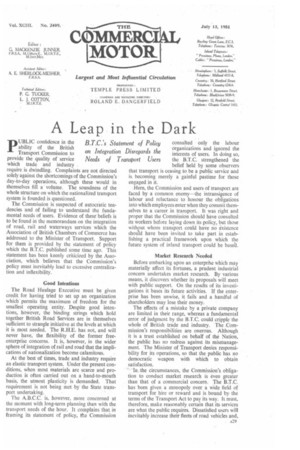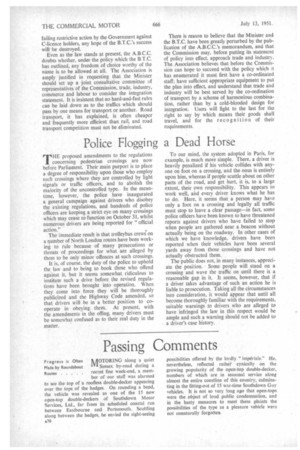A Leap in the Dark
Page 31

Page 32

If you've noticed an error in this article please click here to report it so we can fix it.
pUBLIC confidence in the ability of the British Transport Commission to provide the quality of service which trade and industry require is dwindling. Complaints are not directed solely against the shortcomings of the Commission's day-to-day operations, although these would in themselves fill a volume. The soundness of the whole structure on which the nationalized transport system is founded is questioned_ The Commission is suspected of autocratic tendencies and of failing to understand the fundamental needs of users. Evidence of these' beliefs is to be found in the memorandum on the integration of road, rail and waterways services which the Association of British Chambers of Commerce has addressed to the Minister of Transport. Support for them is provided by the statement of policy which the B.T.C. published some time ago. This statement has been keenly criticized by the Association, which believes that the Commission's policy must inevitably lead to excessive centralization and inflexibility.
Good Intentions The Road Haulage Executive must be given credit for having tried to set up an organization which permits the maximum of freedom for the smallest operating entity. Despite good intentions, however, the binding strings which hold together British Road Services are in themselves sufficient to strangle initiative at the levels at which it is most needed. The R.H.E. has not, and will never have, the flexibility of the former freeenterprise concerns. It is, however, in the wider sphere of integration of rail and road that the implications of nationalization become calamitous.
At the best of times, trade and industry require an elastic transport system. Under the present conditions, when most materials are scarce and production is often carried out on a hand-to-mouth basis, the utmost plasticity is demanded. That requirement is not being met by the State transport undertaking.
The A.B.C.C. is, however, more concerned at the moment with long-term planning than with the transport needs of the hour. It complains that in framing its statement of policy. the Commission consulted only the labour organizations and ignored the interests of users. In doing so, the B.T.C. strengthened the belief held by some observers that transport is ceasing to be a public service and is becoming merely a gainful pastime for those engaged in it.
Here, the Commission and users of transport are faced by a common enemy—the intransigence of labour and reluctance to honour the obligations into which employees enter when they commit themselves to a career in transport. It was right and proper that the Commission should have consulted its workers before laying down its policy, hut those without whom transport could have no existence should have been invited to take part in establishing a practical framework upon which the future system of inland transport could be basell.
Market Research Needed Before embarking upon an enterprise which may materially affect its fortunes, a prudent industrial concern undertakes market research. By various means, it discovers whether its proposals will meet with public support. On the results of its investigations it bases its future activities. lithe enterprise has been unwise, it fails and a handful of shareholders may lose their money.
The effects of a mistake by a private company are limited in their range, whereas a fundamental error of judgment by the B.T.C. could cripple the whole of British trade and industry. The Commission's responsibilities are onerous. Although it is a trust established on behalf of the Nation, the public has no redress against its mismanagement. The Minister of Transport denies responsibility for its operations, so that the public has no democratic weapon with which to obtain satisfaction.
In the circumstances, the Commission's obligation to conduct market research is even greater than that of a commercial concern. The B.T.C.• has been given a monopoly over a wide field of transport for hire or reward and is bound by the terms of the Transport Act to pay its way. It must, therefore, make reasonably certain that its services are what the public requires. Dissatisfied users will inevitably increase their fleets of road vehicles and, failing restrictive action by the Government against C-licence holders, any hope of the B.T.C.'s success will be destroyed.
Even as the law stands at present, the A.B.C.C. doubts whether, under the policy which the B.T.C. has outlined, any freedom of choice worthy of the name is to be allowed at all. The Association is amply justified in requesting that the Minister should set up a joint consultative committee of representatives of the Commission, trade, industry, commerce and labour to consider the integration statement. It is insistent that no hard-and-fast rules can be laid down as to the traffics which should pass by one means for transport or another. Road transport, it has explained, is often cheaper and frequently more efficient than rail, and road transport competition must not be eliminated. There is reason to believe that the Minister and the B.T.C.have been greatly perturbed by the publication of the A.B.C.C.'s memorandum, and that the Commission may, before putting its statement of policy into effect, approach trade and industry. The Association believes that before the Commission can hope to succeed with the policy which it has enumerated it must first have a co-ordinated staff; have sufficient appropriate equipment to put the plan into effect, and understand that trade and industry will be best served by the co-ordination of transport by a scheme of harmonious combination, rather than by a cold-blooded design for integration. Users will fight to the last for the right to say by which means their goods shall travel, and for the recognit ion of their requirements.




























































































